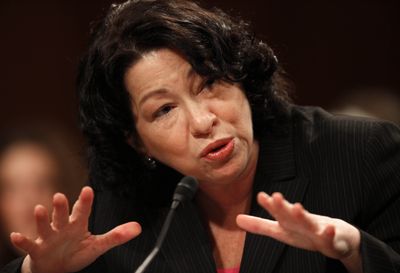Sotomayor deflects abortion queries
Supreme Court nominee elusive on personal views

WASHINGTON – Supreme Court nominee Sonia Sotomayor refused Wednesday to detail her personal views on abortion, saying she couldn’t answer questions about the law “in the abstract,” as Republican senators pressed her repeatedly about whether she would let her feelings and background intrude on her rulings.
The Senate Judiciary Committee’s third day of confirmation hearings featured Republicans hammering away at what’s become a familiar theme: their assertion that Sotomayor’s record of restraint and even moderation as a judge seems to conflict with the fire and advocacy that they say she’s displayed in some speeches.
“I need your help trying to reconcile those two pictures,” said Sen. John Cornyn, R-Texas, “because I think a lot of people have wondered about that.”
Sotomayor remained the cool, methodical and sometimes bantering judge at the Senate witness table, explaining that her personal views on potential cases are hardly relevant.
Since the committee has a 12-7 Democratic majority, the federal appellate judge’s bid to become the first Hispanic Supreme Court justice is expected to encounter little trouble.
The first exchange over abortion came as Cornyn noted that the White House reportedly was offering vague assurances to abortion rights groups in May that Sotomayor would be sympathetic to their views.
How would they know that? Cornyn wondered. Sotomayor said she didn’t know.
“I was asked no question by anyone, including the president, about my views on any specific legal issue,” she said.
Cornyn wondered about the basis for such White House whispers.
“You just have to look at my record to know that in the cases that I addressed on all issues, I follow the law,” Sotomayor said.
In her 17 years as a federal district and appellate judge, Sotomayor rarely got involved in abortion cases. She did rule on President George W. Bush’s “Mexico City policy,” which barred public funds to organizations that promote abortion in other countries. President Barack Obama reversed that policy in January.
Sotomayor sided with Bush, ruling against the abortion rights groups, in her 2002 decision. Her ruling relied largely on legal precedent, however, and didn’t deal with the abortion issue.
Sen. Tom Coburn, R-Okla., tried to pin down Sotomayor personally, but she wouldn’t bite. Asked to describe “settled law” on abortion, she said she abided by current law, and she recited recent court rulings.
What about late-term abortion, Coburn asked, if a 38-week-old fetus has a terrible disease?
“I can’t answer that question in the abstract,” Sotomayor said.
She’s said repeatedly that she’d rely at least partially on legal precedent to guide her. The Supreme Court, said Sen. Arlen Specter, D-Pa., “has had 38 cases after Roe v. Wade where it could have reversed” the 1973 decision that legalized abortion in many cases. Wouldn’t that case, Specter asked, become an important precedent for other cases?
Sotomayor answered judiciously.
“The history of a particular holding of the court and how the court has dealt with it in subsequent cases would be among one of the factors of many that a court would likely consider,” she said.